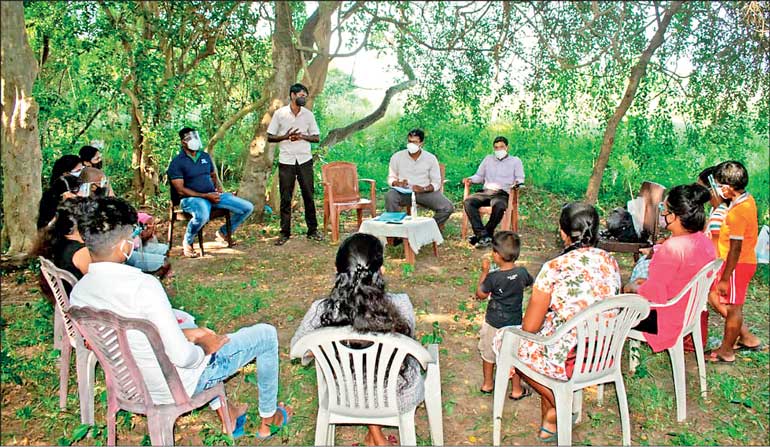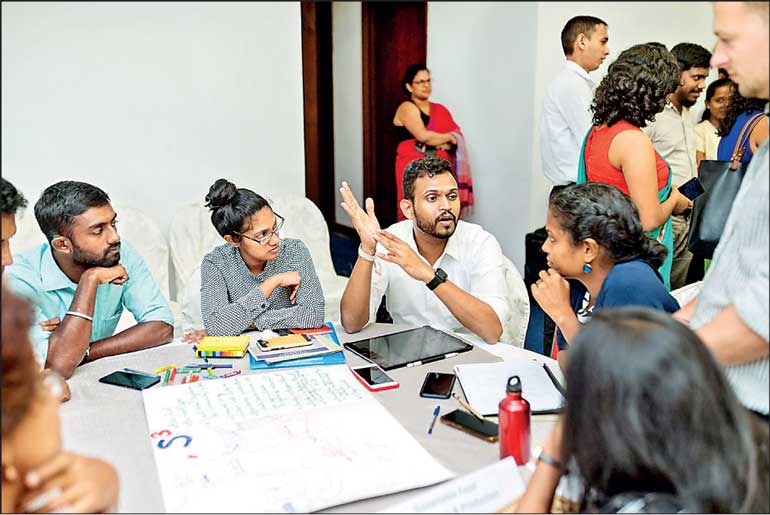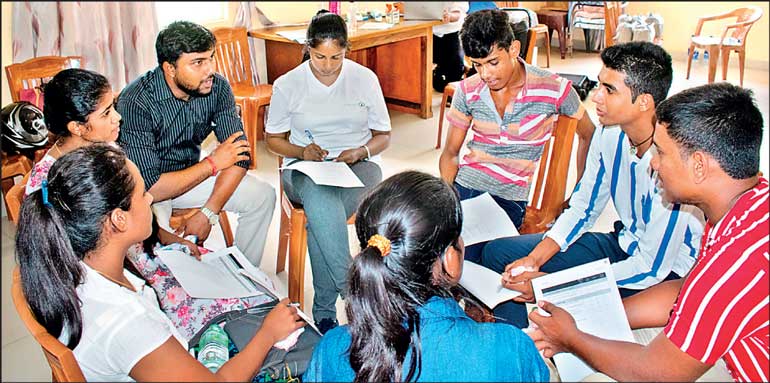Thursday Feb 19, 2026
Thursday Feb 19, 2026
Saturday, 7 August 2021 00:05 - - {{hitsCtrl.values.hits}}

Youth groups and organisations offer a way to undertake youth-led projects
|
Youth engagement can be a crucial element to successful ecosystem conservation
|
On 12 August, the world celebrates International Youth Day for the 22nd time. This year, the theme is ‘transforming food systems through youth innovation for human and planetary health,’ which combines three important aspects: climate and the environment, food systems, and the need for transformation.
Working food systems are vital for the survival of human society, and food security is one of the key components of ensuring the resilience of communities and households. However, current food systems with their supply and value chains are responsible for approximately 25% of the world’s greenhouse gas emissions, making them major contributors to climate change and a priority area for climate action.
On the other hand, crop cultivation, livestock, fisheries, and forestry are also highly exposed and vulnerable to climatic changes and environmental degradation. Therefore, urgent action and a transition to greener, more sustainable, and more resilient food production and consumption is needed.
In this context, International Youth Day offers the opportunity to reflect on a key question: What is the role of youth when it comes to climate change and food systems? How can young people engage and participate in transformation and climate action? How can their engagement be facilitated and enhanced? And how are youth affected by these processes?
Youth in food systems and climate action
Globally, 1.21 billion people or roughly 15.5% of the world’s population are between 15 and 24 years old. In Sri Lanka, approximately 4.64 million people are between the ages of 15 and 29 years, almost a quarter of the country’s entire population. Beyond these numbers, youth are important in many different ways:
Youth are key stakeholders in scaling up and enhancing climate action and development. The decisions made today will set the course for their future and might be irreversible once they are locked in. Today’s youth and future generations will have to bear the consequences of current actions or inactions, and their needs should be recognised in any mid- to long-term decision-making processes.
Young people are vulnerable to the impacts of climate change and the failure of food systems. Due to their development needs and less established income, their health, wellbeing, development, and careers are at a higher risk in cases of food insecurity, nutritional deficiencies, loss of livelihoods, prolonged drought or heat waves, and climate-related disasters.
In addition to this, youth are also the decision-makers of the future. They will decide on policies, laws, and actions, which highlights the importance of investing in their education, capacity-building, and access to opportunities.
However, youth face challenges and barriers when they try to engage. Findings from consultations and research indicate the need for awareness and understanding of institutions and processes, for technical knowledge and capacities, for access to resources, funding, and technology, for inclusion in policies and plans, and for the ability to connect with each other.
Furthermore, the integration of project implementation and engagement in action linked to climate change and resilience-building could present complications due to lack of time, as young people have to focus on their education, training, and employment.
In rural areas, agriculture is not always the livelihood that youth are drawn to. Due to the inherent uncertainties and risks, which are greatly exacerbated by climate change, many rural youth move away from their families’ agricultural practices and look for employment which is unrelated to food systems, in hopes of a steady income that is less affected by climate and disaster risks.
Climate change itself often presents a serious obstacle as it decreases agricultural incomes, causes extreme weather events, and negatively impacts development and education through increasing heat, water scarcity, diseases, pests, and a range of other impacts.
The global context on food systems and climate change
Year 2021 is one that promises a multitude of opportunities for youth to make their voices heard and actively contribute to designing the climate-resilient food systems of the future. The United Nations Food Systems Summit is convened in 2021 by the United Nations Secretary-General, António Guterres.
While the main summit will take place in September, work has already begun through global and national dialogues, hundreds of independent dialogues around the world, and a Pre-Summit from 26-27 July 2021. The outputs of these proceedings feed into solutions and thematic areas under five action tracks and four “levers of change,” which comprise gender, human rights, finance, and innovation.
Climate change is most relevant to action track 5 (build resilience to shocks and stress) but intersects with all action tracks in some way, for example action track 3 (through emission reduction through more nature-friendly production) or action track 4 (through social protection and skills development for a just transition toward green food systems).
Apart from the Food Systems Summit, 2021 is also scheduled to see important meetings of the conference of the parties to the United Nations Framework Convention on Climate Change (UNFCCC COP26) and the Convention on Biological Diversity (CBD COP15). Furthermore, 2021 is the first year in the United Nations ‘Decade of Action’ to deliver significant progress on all seventeen Sustainable Development Goals (SDGs) as well as the beginning of the United Nations Decade on Ecosystem Restoration.
The role of youth
Food systems, climate change, and environmental conservation are deeply interlinked, and addressing this nexus is one of the most pressing challenges of today. How can youth contribute to climate action and resilient food systems? There are many ways for youth to engage, and many ways for other actors to support youth engagement. Youth can play different roles and contribute a multitude of viewpoints and idea, often with great energy and initiative.
Youth can develop rural regions and bring new life to traditional food systems, for example as entrepreneurs who set up businesses that diversify the rural economy, provide value addition, or support sustainable lifestyles. Youth can harness innovations and the power of technology, opening up a new world of possibilities for agriculture, fisheries, or forestry.
They can spread awareness and knowledge on climate change and food systems, be part of national and international processes, and make their voices heard. In addition, young people can be champions and ambassadors, organise in groups and networks, share experiences, and start their own projects.
Celebrating International Youth Day 2021
This International Youth Day, many entities and organisations are organising events to highlight the importance of youth engagement and youth participation. To expand on this and explore youth perspectives and engagement on food systems and climate change, SLYCAN Trust is organising a global independent dialogue on 12 August that will launch a dialogue series on youth engagement in climate action and resilient food systems which aims to cover all nine provinces of Sri Lanka through provincial-level sessions.
The inputs received from these dialogues will be shared with the key stakeholders working on climate change, food systems and sustainable development connected to all five United Nations Food Systems Summit action tracks. They will also contribute to the development of a strategy for youth engagement in climate policy that SLYCAN Trust is developing in collaboration with key stakeholders, including youth themselves.
Next week, join youth all over the world as they highlight their vital role as stakeholders and actors for better food systems and decisive climate action. International Youth Day can serve as a reminder to include young people in policies, plans, and actions on all levels and make their voices heard when it comes to transformation, innovation, and a greener and more sustainable future.
(Footnote: For further information on the activities around International Youth Day and to engage in the independent dialogues, kindly write to [email protected].)

Youth offer important and unique viewpoints, ideas, and innovations

Capacity-building workshops provide an opportunity for youth to learn and make their voices heard
(The writer works as Director – Research & Knowledge Management at SLYCAN Trust, a non-profit think tank based in Sri Lanka. His work focuses on climate change, adaptation, resilience, just transition, human mobility, and a range of related issues. He holds a Master’s degree in Education from the University of Cologne, Germany and is a regular writer to several international and local media outlets.)